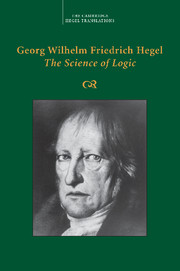Introduction
Published online by Cambridge University Press: 30 September 2021
Summary
GENERAL CONCEPT OF LOGIC
In no science is the need to begin with the fact [Sache] itself, without preliminary reflections, felt more strongly than in the science of logic. In every other science, the matter that it treats, and the scientific method, are distinguished from each other; the content, moreover, does not make an absolute beginning but is dependent on other concepts and is connected on all sides with othermaterial. It is therefore permitted to these sciences to speak of their ground and its context, as well of their method, in the form of lemmas; to apply presupposed forms of definitions and the like without further ado, as known and accepted; and to make use of customary ways of argumentation in order to establish their general concepts and fundamental determinations.
Logic, on the contrary, cannot presuppose any of these forms of reflection, these rules and laws of thinking, for they are part of its content and they first have to be established within it. And it is not just the declaration of scientific method but the concept itself of science as such that belongs to its content and even makes up its final result. Logic, therefore, cannot say what it is in advance, rather does this knowledge of itself only emerge as the final result and completion of its whole treatment. Likewise its subject matter, thinking or more specifically conceptual thinking, is essentially elaborated within it; its concept is generated in the course of this elaboration and cannot therefore be given in advance.What is anticipated in this Introduction, therefore, is not intended to ground as it were the concept of logic, or to justify in advance its content and method scientifically, but rather to make more intuitable, by means of some explanations and reflections of an argumentative and historical nature, the standpoint from which this science ought to be considered.
Whenever logic is taken as the science of thinking in general, it is thereby understood that this “thinking” constitutes the mere form of a cognition; that logic abstracts from all content, and the so-called second constitutive piece that belongs to the cognition, namely the matter, must be given from elsewhere;
- Type
- Chapter
- Information
- Georg Wilhelm Friedrich Hegel: The Science of Logic , pp. 23 - 44Publisher: Cambridge University PressPrint publication year: 2010

